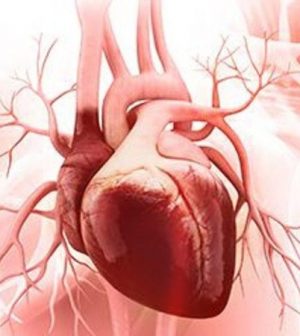- Could Your Grocery Store Meat Be Causing Recurring UTIs?
- Are You Making This Expensive Thermostat Error This Winter?
- Recognizing the Signs of Hypothyroidism
- 10 Strategies to Overcome Insomnia
- Could Artificial Sweeteners Be Aging the Brain Faster?
- Techniques for Soothing Your Nervous System
- Does the Water in Your House Smell Funny? Here’s Why
- Can a Daily Dose of Apple Cider Vinegar Actually Aid Weight Loss?
- 6 Health Beverages That Can Actually Spike Your Blood Sugar
- Treatment Options for Social Anxiety Disorder
COVID-19’s Damage to Organs Can Harm Heart, Too

COVID-19 can damage a person’s heart even if the coronavirus doesn’t directly infect the heart tissue, a new study has found.
The severe inflammation that COVID causes in other organs, like the lungs, appears to indirectly cause heart damage associated with the infection, researchers report.
“After a COVID infection, the immune system can inflict remote damage on other organs by triggering serious inflammation throughout the body – and this is in addition to damage the virus itself has directly inflicted on the lung tissue,” senior author Dr. Matthais Nahrendorf, a professor of radiology at Harvard Medical School, said in a news release.
For the study, researchers analyzed heart tissue samples taken from 21 patients who died with COVID-related lung failure. These samples were compared to specimens from 33 patients who died from causes unrelated to COVID.
The research team specifically focused on immune cells called cardiac macrophages. These cells normally help keep heart tissue healthy by sustaining metabolism and clearing out harmful bacteria, but can cause harmful inflammation in response to a heart attack or heart failure.
Researchers found that COVID infection increased the total number of cardiac macrophages in human heart tissue, and caused them to shift from their normal routine and become inflammatory.
This inflammation can weaken the heart, Nahrendorf said
A mouse study confirmed what researchers found in human tissue samples. Mice infected with COVID had immune responses strong enough to cause the same heart macrophage shift from helpful to harmful, researchers said.
“These findings can also be applied more generally, as our results suggest that any severe infection can send shockwaves through the whole body,” Nahrendorf said.
The research team also found that blocking the immune response in mice with an antibody treatment stopped the flow of inflammatory cardiac macrophages and prevented heart damage.
This suggests that “suppressing the inflammation through treatments might help minimize these complications,” researcher Michelle Olive, associate director of the Basic and Early Translational Research Program at the National Heart, Lung, and Blood Institute, said in a news release.
However, preventive measures to help COVID patients avoid heart damage need to be tested in humans, Nahrendorf said.
The new study appears in the journal Circulation.
More information
The U.S. Centers for Disease Control and Prevention has more about COVID.
SOURCE: National Heart, Lung, and Blood Institute, news release, March 20, 2024
Source: HealthDay
Copyright © 2026 HealthDay. All rights reserved.










